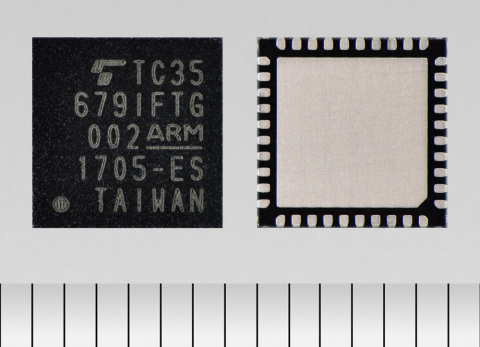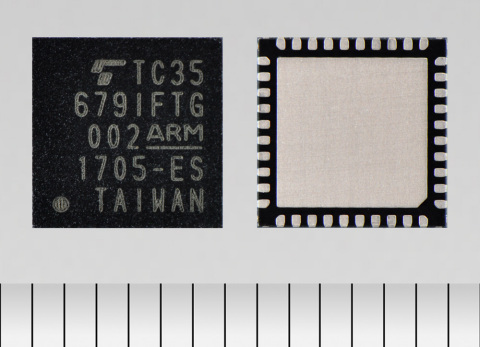TOKYO--(BUSINESS WIRE)--Toshiba Electronic Devices & Storage Corporation has announced a new IC that is compliant with Bluetooth® low energy (LE) [1] core specification 4.2 including support for secure connection, LE privacy features and extended packet length support. It is available for use in harsh automotive environments and extended temperature ranges. The mixed-signal TC35679IFTG contains both analog RF and baseband digital parts to provide a complete solution in a single, compact and low-profile, 40-pin 6mm x 6mm x 1mm QFN ‘wettable flank’ package, with a pin pitch of 0.5mm.
The TC35679IFTG provides Bluetooth® Host Control Interface (HCI) functions alongside low energy GATT profile functions (as defined by Bluetooth®) specifications. The new IC becomes a fully-fledged application processor when used in conjunction with an external non-volatile memory, or can be used in combination with an external host processor.
The highly integrated device is based on an Arm® Cortex®-M0 processor and includes a sizeable 384KB of on-board mask ROM to support the Bluetooth® baseband process and a further 192KB of on-board RAM for Bluetooth® application programs and data.
A key feature of the TC35679IFTG is its ability to form part of sophisticated systems as a result of 17 General Purpose IO (GPIO) lines and multiple communications options including SPI, I2C and a 921.6kbps, two-channel UART. The GPIO lines offer access to a range of on-chip features including a wake-up interface, four-channel PWM interface, 6-channel AD converter and the ability to control the control interface of an optional external power amplifier for applications requiring a longer reach. On chip DC-DC converter or LDO circuits adjust the external voltage supply to the required values on chip.
Designed for compliance with AEC-Q100[2], the low energy IC is primarily intended to be used in automotive applications. The wettable flank package simplifies automatic visual inspection needed to deliver the high levels of soldering quality required to withstand vibration experienced in automotive applications.
Current applications include remote key systems and reducing cables by providing a reliable wireless connection to sensors. The device will also facilitate remote connection to diagnostic equipment, creating a Bluetooth® 'soft' On-Board Diagnostic (OBD) port, thereby saving the cost and weight of the associated cabling and OBD connector.
The TC35679 accepts a wide range of supply voltages (1.8-3.6V) making it suitable for automotive applications. Operating temperature range is -40˚C to 105˚C for input voltages from 2.7V to 3.6V and -40˚C to 85˚C from 1.8V to 3.6V.
|
Key Features |
| - Low power consumption: |
| 3.3 mA (Transmitter operation @3.0 V, Output Power : 0 dBm) |
| 3.3 mA (Receiver operation @3.0 V) |
| Less than 100nA in deep sleep (@3.0V) |
| - Receiver sensitivity: -93 dBm |
| - Supports Bluetooth® LE Ver.4.2 central and peripheral devices |
| - GATT (Generic Attribute Profile) built in |
| - Supports servers and client functions defined by GATT |
| - Wettable flank package |
| - AEC-Q100 compliant[2] |
Applications
Bluetooth® low
energy communication devices for automotive and industrial applications.
|
Main Specifications |
||
| Part Number | TC35679IFTG | |
| Operating voltage range | 1.8V to 3.6V | |
| Current consumption in TX operation | 3.3 mA (@3.0 V, Output Power : 0 dBm ) | |
| Current consumption in RX operation | 3.3 mA (@3.0V) | |
| Current consumption in deep sleep | Less than 100nA (@3.0V) | |
| Operating temperature range |
-40°C to 85 °C (1.8 to 3.6V) |
|
| Package | QFN40 6 mm x 6 mm 0.5 mm pitch, wettable flank | |
| Wireless Communication |
Bluetooth® low energy Ver.4.2 |
|
| CPU |
Arm® Cortex®-M0 |
|
| Transmitter output power | 0 dBm to -20 dBm (4 dB steps) | |
| Receiver sensitivity | -93.0 dBm | |
| Profiles | HCI, GATT (Generic Attribute Profile), including server and client functions | |
| Interfaces | UART, I2C, SPI, GPIO | |
| Other features |
DC-DC Converter |
|
Notes:
[1]: Low power consumption communication technology defined
in Bluetooth® Ver.4.2.
[2]: Qualification is expected by
the end of the year.
*The Bluetooth® word mark and logos are registered trademarks owned by the Bluetooth SIG, Inc. and any use of such marks by Toshiba is under license. Other trademarks and trade names are those of their respective owners.”
*Arm and Cortex are registered trademarks of Arm Limited (or its subsidiaries) in the US and/or elsewhere.
For more information about the new product, please visit:
https://toshiba.semicon-storage.com/info/lookup.jsp?pid=TC35679IFTG-002®ion=apc&lang=en
For more information about the line-up of Bluetooth® wireless
communication ICs, please visit:
https://toshiba.semicon-storage.com/ap-en/product/wireless-communication/bluetooth.html
Customer Inquiries:
Mixed Signal IC Sales and Marketing
Department
Tel: +81-44-548-2876
https://toshiba.semicon-storage.com/ap-en/contact.html
*Information in this document, including product prices and specifications, content of services and contact information, is current on the date of the announcement but is subject to change without prior notice.
About Toshiba Electronic Devices & Storage Corporation
Toshiba
Electronic Devices & Storage Corporation combines the vigor of a new
company with the wisdom of experience. Since being spun off from Toshiba
Corporation in July 2017, we have taken our place among the leading
general devices companies, and offer our customers and business partners
outstanding solutions in discrete semiconductors, system LSIs and HDD.
Our 19,000 employees around the world share a determination to maximize
the value of our products, and emphasize close collaboration with
customers to promote co-creation of value and new markets. We look
forward to building on annual sales now surpassing 700-billion yen (US$6
billion) and to contributing to a better future for people everywhere.
Find
out more about us at https://toshiba.semicon-storage.com/ap-en/company.html




